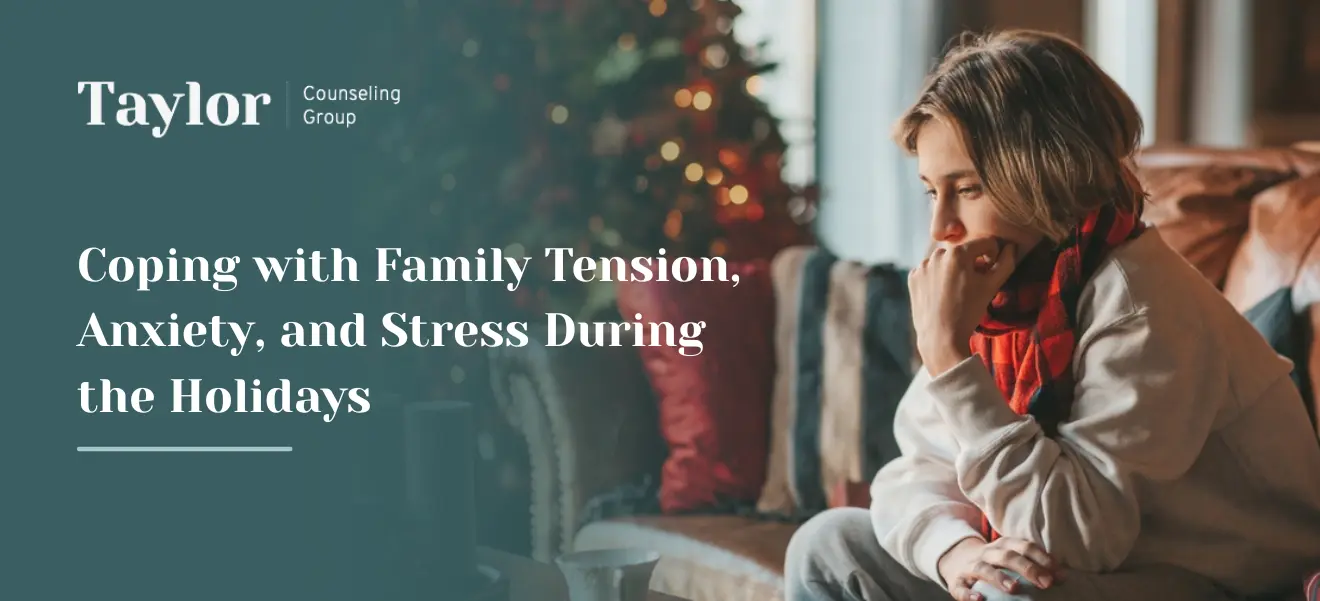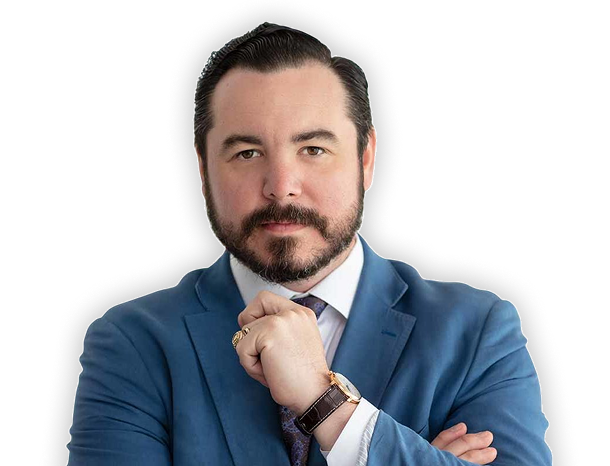The holiday season is often portrayed as a time of joy, togetherness, and celebration. Yet for many people, the weeks between Thanksgiving and New Year’s bring something quite different: dealing with family during the holidays, stress, family conflict, and heightened anxiety.
Research done in 2023 shows that approximately 41% of Americans experience increased stress during the holiday season, with family dynamics being one of the top contributing factors. If you find yourself dreading family gatherings, feeling anxious about holiday obligations, or anticipating conflict with relatives, you’re not alone.
The good news is that with the right strategies and support, you can navigate the holidays with greater peace and resilience. In this guide, we’ll explore practical, evidence-based approaches to managing family tension, anxiety, and stress during the holiday season, so you can actually enjoy this time of year.
At Taylor Counseling Group, our team of more than 50 licensed therapists provides expert support across Texas at 10 locations—including Dallas/Fort Worth, San Antonio, Houston, Austin, and Waco—as well as convenient telehealth options. Our specialists offer personalized, evidence-based treatment plans for family counseling, anxiety management, stress relief, grief and loss recovery, and more, helping you address both holiday-related and everyday mental health challenges. We accept major insurance plans such as Aetna, Cigna, Molina, United, Blue Cross Blue Shield, Medicare, and Tristar, with affordable rates to ensure care is accessible for all.
Why the Holidays Amplify Family Stress and Anxiety

Understanding why the holidays trigger such intense stress and anxiety is the first step toward managing them effectively. The holiday season creates a perfect storm of psychological and practical pressures that can overwhelm even the most resilient individuals emotionally. At Taylor Counseling Group, we help individuals and families navigate these challenges with evidence-based therapeutic approaches.
Unrealistic Expectations and Perfectionism
Deeply ingrained cultural expectations accompany the holidays. We’re supposed to be happy, grateful, and connected. We’re expected to create picture-perfect celebrations, prepare elaborate meals, and maintain cheerful dispositions throughout weeks of festivities. These unrealistic expectations create internal pressure that can manifest as anxiety and stress.
When reality doesn’t match the idealized holiday image we’ve internalized, disappointment and frustration follow. Understanding these patterns is a key component of anxiety management.
Forced Proximity and Unresolved Conflicts
Holiday gatherings often require spending extended time with family members we might not see regularly, including those with whom we have unresolved conflicts or complicated relationships. Being in close quarters with people who trigger us, challenge our boundaries, or remind us of past hurts can quickly escalate tension.
Without healthy coping mechanisms, these situations can lead to arguments, resentment, and emotional exhaustion. This is where family counseling can make a meaningful difference. Our counselors believe family therapy significantly improves communication patterns and reduces conflict.
Financial Pressure and Time Constraints
The financial demands of the holiday season, combined with time pressures from shopping, decorating, cooking, and attending multiple events, create significant stress. Many people struggle with the cost of gifts, travel, and holiday entertainment, which can trigger anxiety about money and feelings of inadequacy if they can’t meet perceived expectations. Learning stress management techniques can help you navigate these pressures more effectively.
Grief and Loss During the Holidays
For those who have experienced loss, the holidays can intensify grief. Empty seats at the table, missing loved ones, or the first holidays after a significant loss can trigger deep sadness and anxiety. The contrast between the expected joy of the season and the reality of grief can feel particularly painful. Professional support through individual therapy can help you process these complex emotions.
How Anxiety Manifests During the Holiday Season
Holiday anxiety can show up in various ways: difficulty sleeping, irritability, physical tension, racing thoughts, avoidance behaviors, or emotional numbness. Some people experience panic attacks or heightened worry about social situations. Others find themselves overeating, drinking more than usual, or withdrawing from activities they usually enjoy. Recognizing these signs in yourself is important for taking action early. UCDavis Health identifies these common anxiety symptoms that respond well to professional treatment.
Practical Strategies for Managing Holiday Stress
 The key to managing holiday stress is developing concrete strategies you can implement before, during, and after family gatherings. These evidence-based approaches can significantly reduce anxiety and help you maintain emotional balance. Whether you’re in Houston, San Antonio, or another location, our counselors can help you develop personalized strategies.
The key to managing holiday stress is developing concrete strategies you can implement before, during, and after family gatherings. These evidence-based approaches can significantly reduce anxiety and help you maintain emotional balance. Whether you’re in Houston, San Antonio, or another location, our counselors can help you develop personalized strategies.
Set Healthy Boundaries with Family
One of the most powerful tools for managing family tension is establishing and maintaining healthy boundaries. Boundaries are not walls that keep people out; they’re guidelines that protect your emotional well-being and allow for healthier relationships. According to the American Psychological Association, setting boundaries is a crucial component of maintaining mental health and managing stress.
Identify Your Limits
Before holiday gatherings, take time to identify what topics, behaviors, or situations trigger you. Do certain relatives make critical comments about your life choices? Does your family have a pattern of discussing politics in ways that escalate into arguments? Do you feel obligated to participate in activities that drain you? Once you identify these patterns, you can prepare responses in advance. This self-awareness is a cornerstone of effective anxiety management.
Communicate Your Boundaries Clearly
Healthy boundaries require clear, respectful communication. Rather than waiting until conflict arises, consider having a conversation with family members beforehand to prevent issues from escalating. Use “I” statements to express your needs: “I need to keep our conversation focused on positive topics,” or “I’m not available to discuss my relationship status this year.” Be specific, calm, and firm. These communication strategies are often taught in family counseling sessions.
Practice Saying No
You don’t have to accept every invitation, activity, or request. It’s okay to decline hosting duties, skip certain events, or limit your time at gatherings. Saying no to protect your mental health is not selfish; it’s self-care. A simple, honest response like “I appreciate the invitation, but I need to prioritize my well-being this year” is sufficient.
Practice Stress-Relief Techniques
Implementing daily stress-relief practices can significantly reduce your overall anxiety levels and help you stay grounded during challenging moments. Research from the Mayo Clinic demonstrates that consistent stress-relief practices improve overall mental health outcomes.
Breathing Exercises and Grounding Techniques
When anxiety rises, your nervous system needs to be calmed. Simple breathing exercises can work wonders. Try the 4-7-8 technique: breathe in for 4 counts, hold for 7 counts, and exhale for 8 counts. This activates your parasympathetic nervous system, which promotes relaxation. Grounding techniques like the 5-4-3-2-1 method (identifying 5 things you see, 4 you can touch, 3 you hear, 2 you smell, 1 you taste) can help you stay present and reduce anxiety during stressful moments. These are evidence-based techniques supported by anxiety management professionals.
Mindfulness and Meditation
Even 10 minutes of daily meditation can reduce stress and anxiety. Apps like Headspace or Calm offer guided meditations specifically designed to help manage holiday stress. Mindfulness practices help you observe anxious thoughts without judgment, reducing their power over you. Research from the National Institute of Mental Health supports meditation as an evidence-based anxiety management technique.
Physical Activity and Movement
Exercise is one of the most effective stress-management tools available. Whether it’s a daily walk, yoga, dancing, or any physical activity you enjoy, movement releases endorphins and reduces cortisol (the stress hormone). During the holiday season, prioritize movement as a non-negotiable part of your self-care routine. The American Heart Association recommends regular physical activity as part of a comprehensive stress management plan.
Time Management and Self-Care
Create a realistic holiday schedule that includes downtime. You don’t need to attend every event or complete every task. Prioritize activities that bring you joy and allow time for rest. Schedule self-care activities like baths, reading, or time with supportive friends just as you would any other important appointment. Developing these skills is a key focus of stress management therapy.
Addressing Family Conflict Before It Escalates
Despite your best efforts, family conflict may still arise. How you handle these moments can determine whether they become minor bumps or major crises. Professional family counseling can equip you with the tools to navigate these situations effectively.
Communication Strategies for Difficult Conversations
If you anticipate a difficult conversation, prepare for it. Decide in advance what you want to communicate and what outcome you’re hoping for. Use “I” statements to express your feelings without blaming: “I feel hurt when…” rather than “You always…” Listen actively to the other person’s perspective, even if you disagree. Sometimes people just need to feel heard. These communication techniques are central to family counseling work.
De-escalation Techniques
If a conversation is becoming heated, take a break. Excuse yourself to get water, take a walk, or use the restroom. This pause can prevent words you’ll regret and give everyone time to calm down. When you return, you can approach the conversation with more clarity and compassion.
When to Step Away
Not every conflict needs to be resolved immediately or at all. If a conversation is becoming toxic or if you’re feeling overwhelmed, it’s okay to step away. You might say, “I care about you, but I’m not in a place to discuss this right now. Can we talk about this another time?” This protects your mental health and often leads to more productive conversations in the future.
Active Listening and Validation
Often, family members want to feel understood and validated. Even if you disagree with someone’s perspective, you can validate their feelings: “I understand why you feel that way, even though I see it differently.” This simple acknowledgment can reduce defensiveness and create space for a more meaningful connection. These skills are taught in couples counseling and family therapy sessions.
When to Seek Professional Support

While self-help strategies are valuable, sometimes professional support is necessary and beneficial. Recognizing when to reach out for help is a sign of strength, not weakness. At Taylor Counseling Group, we offer comprehensive mental health services to support you.
Signs You Might Benefit from Therapy
Consider seeking professional support if you’re experiencing persistent anxiety that interferes with daily functioning, if family conflict is causing significant emotional pain, if you’re struggling with depression or grief during the holidays, or if past trauma is being triggered by family dynamics. Additionally, if you’ve tried self-help strategies without improvement, professional guidance can provide new tools and perspectives. Individual therapy can be particularly helpful in these situations.
How Family Counseling Can Help
Family counseling brings a neutral third party into family dynamics, which can facilitate healthier communication and conflict resolution. A family therapist can help identify patterns that contribute to tension, teach communication skills, and help family members understand each other’s perspectives. Even a few sessions can create significant shifts in family relationships. Research from the American Association for Marriage and Family Therapy demonstrates the effectiveness of family therapy in improving relationships.
Individual Therapy for Anxiety and Stress
Individual therapy allows you to work one-on-one with a therapist to address your personal anxiety, develop coping strategies tailored to your specific situation, and process any underlying issues that the holidays might be triggering. Cognitive-behavioral therapy (CBT) and other evidence-based approaches have strong track records for treating anxiety and stress.
Telehealth Options for Convenience
If scheduling in-person appointments feels overwhelming, telehealth therapy offers flexibility and accessibility. You can attend sessions from the comfort of your home, which can feel safer and less stressful, especially during the busy holiday season. The American Psychological Association confirms that telehealth therapy is as effective as in-person treatment.
Professional Support Available
Our team offers family counseling, anxiety management, stress relief, and a range of other specialties. We understand the unique challenges the holiday season presents and offer personalized treatment plans designed to help you navigate family dynamics with greater ease and confidence.
With multiple locations across Central Texas, including The Woodlands, Houston, and San Antonio, as well as telehealth options available, we make it convenient to get the support you need. Our affordable care options and acceptance of most major insurance plans ensure that professional mental health support is accessible to you.
Frequently Asked Questions
How can I manage anxiety during family gatherings?
Use grounding techniques, such as the 5-4-3-2-1 method, practice breathing exercises, take breaks when needed, and have a support person you can text or call if you feel overwhelmed. Setting boundaries beforehand also reduces anticipatory anxiety. Learn more about anxiety management strategies from our counselors.
What are healthy boundaries with family during the holidays?
Healthy boundaries might include limiting discussions of certain topics, declining activities that drain you, setting time limits on visits, or establishing consequences if someone disrespects your boundaries. Communicate these clearly and calmly before gatherings. Family counseling can help you develop and maintain good boundaries.
How do I handle family conflict during the holidays?
Use “I” statements, listen actively, validate others’ feelings even if you disagree, and know when to step away. If conversations become toxic, it’s okay to excuse yourself and revisit the topic later when everyone is calmer. These techniques are core to family counseling practice.
When should I consider therapy for holiday stress?
If holiday stress is significantly impacting your mental health, if family conflict feels unmanageable, or if you’re struggling with anxiety or depression, professional support can be incredibly helpful. There’s no “right time” to seek help. If you’re struggling, that’s reason enough. Individual therapy and family counseling are both effective options.
Can telehealth counseling help with holiday anxiety?
Absolutely. Telehealth therapy offers the same evidence-based treatment as in-person therapy with added convenience and flexibility. Many people find it easier to open up in the comfort of their own home. Contact Taylor Counseling Group to learn about our telehealth options.
Take the Next Step
The holidays don’t have to be a source of dread and anxiety. With the right strategies and support, you can create a holiday season that feels more peaceful and connected. If you’re struggling with family tension, anxiety, or stress this holiday season, Taylor Counseling Group is here to help. Our experienced counselors and therapists offer family counseling, individual therapy, and couples counseling both online and in-person to help you navigate relationship challenges.
Schedule a consultation with one of our counselors today. With locations throughout Central Texas and convenient telehealth options, getting support has never been easier. Contact Taylor Counseling Group online or call (214) 530-0021 to discover how we can help you have a healthier, happier holiday season.






